Search Results
Showing results 21 to 40 of 40

Leaf it to Me
Source Institutions
In this activity, learners observe the effect of transpiration as water is moved from the ground to the atmosphere.
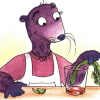
Veggies with Vigor
Source Institutions
In this activity, learners try to revive wilted celery. Learners discover that plants wilt when their cells lose water through evaporation. Use this activity to introduce capillary action.
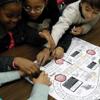
Endangered!
Source Institutions
While playing a game, learners discover how the Endangered Species Act works in the United States. Learners move along a game board by answering questions correctly.

Water "Digs" It!
Source Institutions
In this activity, learners investigate soil erosion. Learners set up a simulation to observe how water can change the land and move nutrients from one place to another.
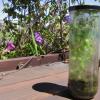
The Self-Watering Terrarium
Source Institutions
In this biology/ecology activity, learners construct a terrarium out of a tennis ball container. This terrarium is unique because it never has to be watered.
Soil Secrets
Source Institutions
In this activity (located at the bottom of the page), learners investigate soil and explore the creatures that live in it.
How Does Water Climb a Tree?
Source Institutions
In this activity, learners conduct an experiment to explore how water flows up from a tree's roots to its leafy crown.
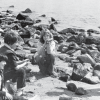
Beachcombing
Source Institutions
In this outdoor activity, learners become beachcombers as they walk on a sandy beach in search of evidence of life.
River Catcher
Source Institutions
In this activity (located at the top of the page), learners make an easy river strainer and see what they can catch.
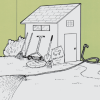
Out of Control
Source Institutions
In this outdoor activity, learners release a portion of a lawn from human control—no mowing, no watering, no weeding, no pest control—and then investigate the changes that result over several weeks.

Take a Hike!: A Family Forest Walk
Source Institutions
In this family or group inquiry activity, learners use their senses to explore a local forest or woodland.

What-a-cycle
Source Institutions
In this activity, learners act as water molecules and travel through parts of the water cycle to discover that it is more complex than just water moving from the ground to the atmosphere.
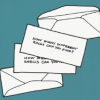
Envirolopes
Source Institutions
In this outdoor activity and observation game, learners hunt for a variety of textures, colors, odors and evidence of organisms in the activity site.
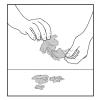
Of Cabbages and Kings
Source Institutions
This lesson gives full instructions for making cabbage juice indicator, a procedure sheet for learners to record observations as they use the indicator to test materials, and extension activities to d

Gaming in the Outdoors
Source Institutions
In this set of outdoor games, learners increase their awareness of the outdoor environment by going on a scavenger hunt and an out-of-place hunt.
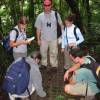
Creating a Local Field Guide
Source Institutions
In this activity, learners survey living organisms near where they live or go to school, and create a local field guide.
Composting: A Scientific Investigation
Source Institutions
In this activity, learners conduct a scientific investigation involving decomposition and discover that the life cycle of trash is affected by its organic or inorganic nature.

Sensory Hi-Lo Hunt
Source Institutions
In this outdoor activity, learners use only their senses to to find the extremes of several environmental variables or physical factors: wind, temperature, light, slope and moisture.

Size Wheel
Source Institutions
In this fun sticker activity, learners will create a size wheel with images of objects of different size, from macroscopic scale (like an ant) to nanoscale (like DNA).

As Straight as a Pole
Source Institutions
In this engineering activity (page 3 of PDF), young learners investigate how a pole can be made stable by “planting” its base in the ground or adding supports to the base.
